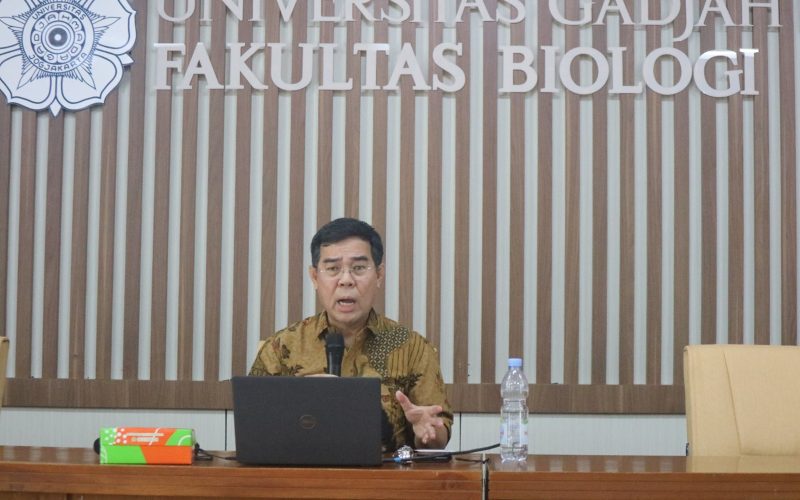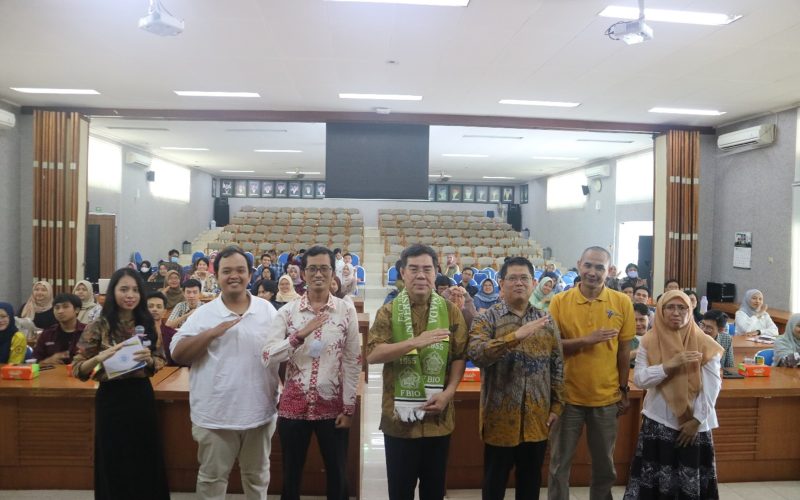Yogyakarta, 1 June 2024 – The Faculty of Biology, Universitas Gadjah Mada held a Stadium Generale entitled The Role of Research in the Development of the Palm Oil Industry. The public lecture which was held in the Tropical Biology Auditorium, Faculty of Biology UGM, was attended by lecturers and students, with speaker Dr. Tony Liwang, member of Research and Development Committee of the Palm Oil Plantation Fund Management Agency (BPDP KS).
“Indonesia is the largest palm oil producer in the world, and we as researchers are expected to be able to contribute to the development of research and applications for managing these plantation products,” said Prof. Dr. Budi Setiadi Daryono, M.Agr.Sc. as Dean of the Faculty of Biology UGM in his speech on Saturday (1/6). He added that research contributions and applications need to be continued, especially to support economic improvement and community welfare.
The public lecture was then guided by Tia Efriansi, S.Si, one of the students in the Faculty of Biology UGM doctoral study program. Tia gave an overview of how the palm oil industry in Indonesia has developed to date and its potential, before then introducing lecture speakers from the Research and Development Committee of the Palm Oil Plantation Fund Management Agency (BPDP KS), Dr. Tony Liwang.
Dr. Tony Liwang is a member of the Research and Development Committee of the Palm Oil Plantation Fund Management Agency (BPDP KS). He is the inventor of 12 varieties of oil palm, including cloned plants resulting from oil palm tissue culture with high productivity, as well as the discoverer of more than 300 genes that have been registered in GeneBank. There are at least 14 patents under Dr. Tony’s name which has been applied on a commercial scale.
“Palm oil is the largest oil and gas foreign exchange contributor in Indonesia,” said Dr. Tony in his presentation Saturday (1/6). He emphasized the huge potential of palm oil produced by Indonesia every year, and the potential for post-harvest waste management research which is still being developed.
Palm oil itself is a component that is often found in everyday life, through food products or food derivatives produced by various multinational companies. These include cooking oil, margarine, milk, vitamins and supplements, and even soap.
The Palm Oil Plantation Fund Management Agency (BPDP KS) plays a role in managing funds for the development of sustainable palm oil research in Indonesia. Dr. Tony gave a presentation on several potential research that had been supported by BPDP KS, including innovations in the production of ligninolytic enzymes, CMC edible mushrooms, and organic fertilizer from empty oil palm fruit bunches (TKKS), bioplastic production technology from empty oil palm fruit bunches (TKKS), production of calcium soap from palm oil fat (PFAD) to increase cow’s milk production, production of MDAG (emulsifier) from palm oil, production of printing ink (green varnish) from palm oil derivatives, production of thread and fabric from empty palm fruit bunch fiber (TKKS), production of biochar (propolis charcoal), and so on.
“The challenge of research development is that it often stops at the initial research stage and is difficult to reach the commercialization stage,” said Dr. Tony is next. He said that the biggest problem was in the process of scaling up research results to the industrial level. In this case, BPDP KS plays a role in bridging palm oil research and development to produce products and technology up to the commercialization stage.
The public lecture was continued with a question-and-answer session between participants and resource persons. Participants were very enthusiastic throughout the lecture and it is hoped that through the lecture presentation they can stimulate innovative and applicable ideas, especially in supporting the development of palm oil research, as well as indirectly participating in economic growth and prosperity in Indonesia.
SDGS point tags: SDG 4, 8, 9, 12, 17





